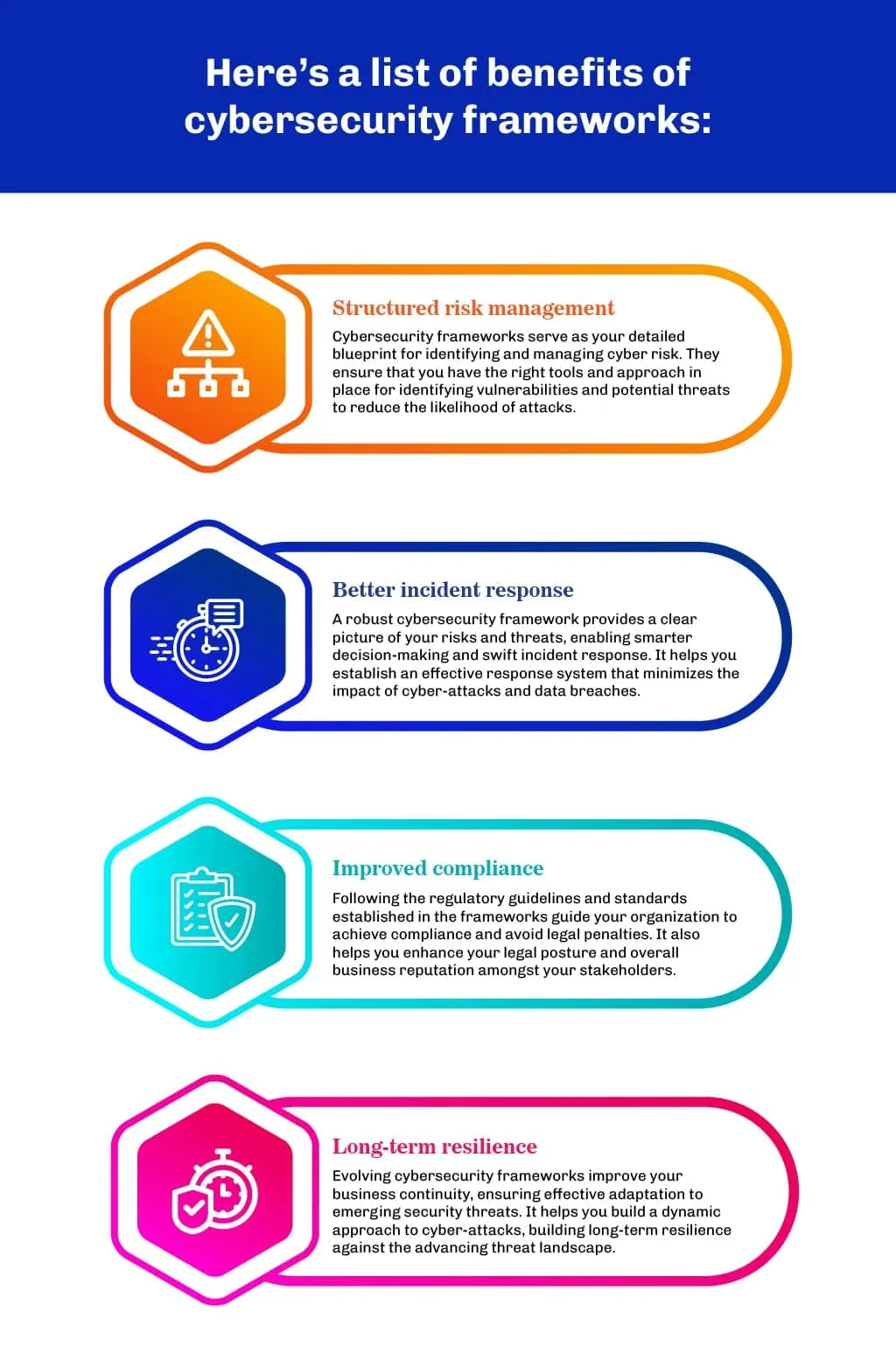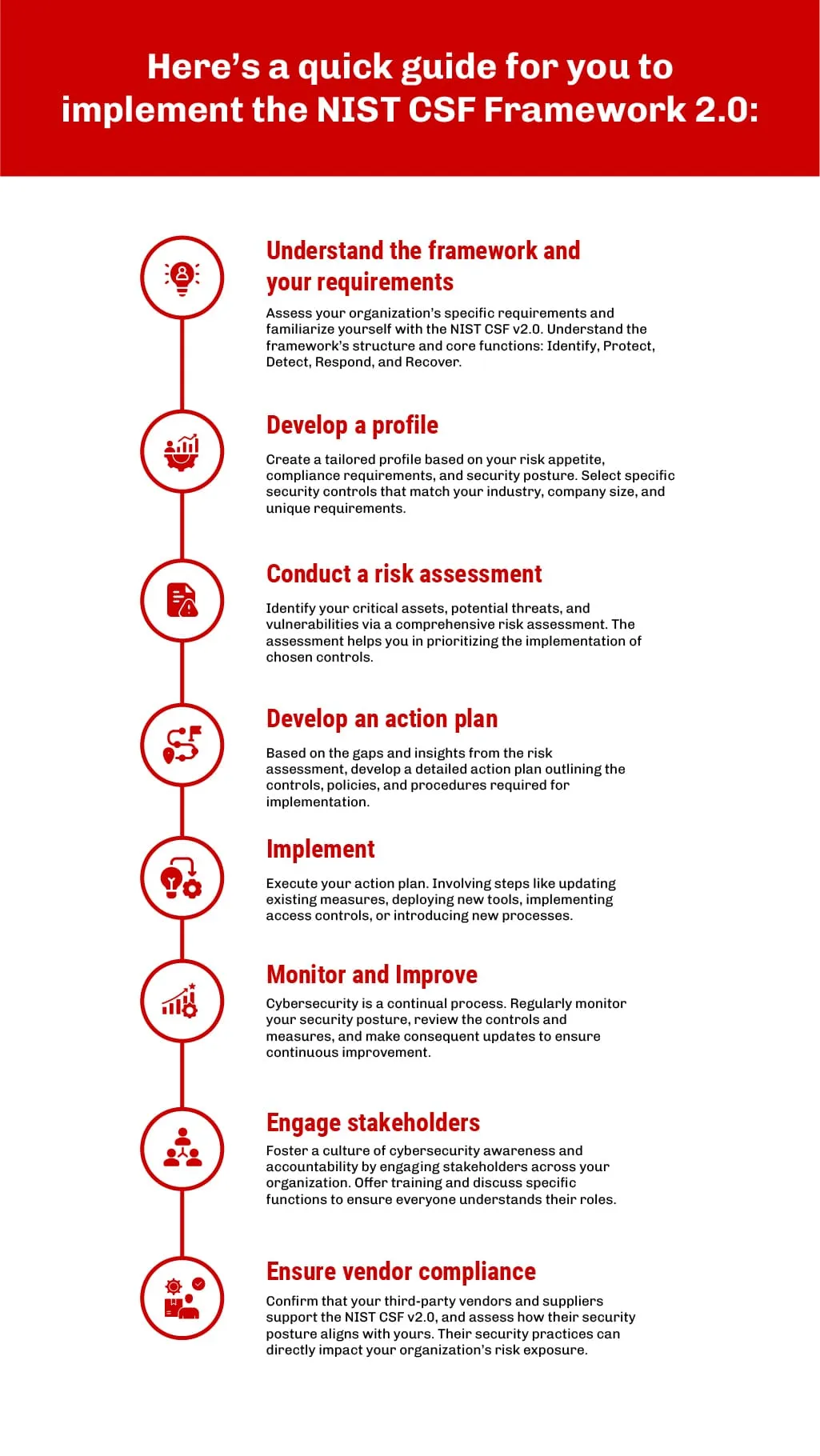Blog
The 3W’s of Cybersecurity Frameworks – What, Why, and When

With new cybersecurity incidents making headlines week after week, every organization is under threat to be the next victim. 75% of security professionals have observed a rise in cyber attacks in the past year. What makes these attacks more concerning is the long-lasting impact — It takes organizations approximately 277 days to identify and contain a data breach.
Amidst these rising threats and the complicated world of cyber attacks, how confident are you about your cybersecurity measures? Do you have a reliable plan of action if your organization were to face a cyber attack today?
This is where a cybersecurity framework comes in handy. Let’s have a closer look at what cybersecurity frameworks are, why they’re important, and signs that you need one.
What are Cybersecurity Frameworks?
A cybersecurity framework is your guide to protect your organizational data and fight security threats. Think of it as your game plan to manage cybersecurity risks. The framework includes standards, guidelines, and best practices to improve your defense and security posture.
At its core, the framework serves as your guide to identify critical assets, detect vulnerabilities, respond to threats, and recover from incidents. It offers a systematic roadmap for you to enhance your cybersecurity readiness. With the common language and established approach, it creates an end-to-end, centralized way to deal with threats throughout your organization.
Why Do You Need A Cybersecurity Framework?
2023’s MOVEit Attack is the perfect lesson for why you need a cybersecurity framework. In the attack, hackers exploited a zero-day vulnerability, causing a massive data breach that impacted over 2000 organizations and 62 million individual’s sensitive information.
But the entire episode could have been avoided with a robust cybersecurity framework. Adopting the said framework helps organizations be prepared to fight random attacks, prevent data infiltrations, and protect their critical assets.

When You Should Use A Cybersecurity Framework
Here are key situations when adopting a cybersecurity framework becomes essential:
-
You have an outdated cybersecurity posture (or lack one)
When were your cybersecurity measures last updated? Hackers and attacks are becoming increasingly advanced and sophisticated. If your organization still relies on outdated security practices or doesn’t have a clear cybersecurity strategy, you’re more vulnerable to modern threats. It’s time you adopt an up-to-date framework to bolster your defense.
-
You have strict compliance requirements
Industries such as healthcare, finance, and government, have strict regulatory requirements for data protection and cybersecurity. Frameworks like NIST CSF or ISO 27001 can help you navigate their compliance requirements and avoid costly legal penalties.
-
You have sensitive data
Handling sensitive information such as PIIs or IPs without a robust cybersecurity framework is a recipe for disaster. Adopting a proper framework helps you identify and protect your critical assets, saving both — the sensitive information and your reputation.
-
You’ve experienced a security breach before
A past security breach is a clear wake-up call that your existing security measures aren’t exactly sufficient. Having a framework can improve your security posture, helping you identify and patch vulnerabilities. The stronger controls enable you to prevent similar incidents from occurring in the future.
-
Your organization is expanding
As your business expands, so does your attack surface. New assets, systems, and personnel can introduce new vulnerabilities. A cybersecurity framework ensures that your security posture scales with you, protecting your expanding environment.
Using NIST CSF v2.0 — An Effective Cybersecurity Framework
The NIST Cybersecurity Framework (CSF) is one of the most widely adopted cybersecurity frameworks. Developed by the National Institute of Standards and Technology (NIST), it provides a flexible and risk-based approach to enhancing cybersecurity readiness.
The latest version, NIST CSF v2.0, released in 2023, has expanded its reach beyond critical infrastructure to target all organizations including government, industry, and academia. They’ve also introduced a vast array of new tools for better response, recovery, and governance functionalities.
These updates have made NIST CSF 2.0 a great choice for organizations looking for a strong cybersecurity posture.
NIST CSF Framework 2.0
- Identify
- Protect
- Detect
- Respond
- Recover

Key Takeaway
As most organizations store their data in the cloud and embrace cloud computing, cloud security has become a critical concern. The NIST CSF v2.0 framework offers a seamless path to leverage the benefits of modern cloud-based cybersecurity services.
The framework offers a comprehensive, risk-based approach to enhancing your organization’s cloud security. It helps you implement modern cloud-based cybersecurity solutions that eliminate the need for complex infrastructure and operate over a more flexible, pay-as-you-go model.
At Paramount Assure, we help you seamlessly adopt modern AI and cloud-based cybersecurity solutions aligned with the latest industry standards and compliance requirements. Our dedicated team of 60+ cybersecurity consultants can guide you through every stage of implementing robust cloud-based cybersecurity measures, keeping you ahead of all cyber threats.
ABOUT AUTHOR
Recent Posts

Protect your online assets from cyber threats with Paramount

Comprehensive cyber security solutions for individuals and businesses

Significantly reduce the risk of cyber threats and ensure a safer digital environment.


